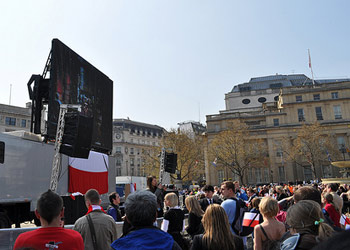Mourning Together at Trafalgar Square
In warm afternoon sunshine thousands of Poles living in London marked the state funerals of Polish President Lech Kaczyński and his wife Maria with reverence and quiet dignity.
In London’s Trafalgar Square – the capital’s traditional venue for mass public meetings which can hold 10,000 people – a huge television screen on Sunday broadcast footage from Krakow’s St. Mary’s Basilica and Wawel Cathedral of the president and first lady’s requiem mass. The event’s organisers – the London-based Civic Organisation Committee – estimated a crowd of around 5,000 Poles and other non-Polish Londoners had gathered to watch the Krakow religious services. As well as live TVP Polonia pictures of the funerals beamed into the Square, speeches were made from a flag-draped podium by Poland’s Ambassador to London, Barbara Tuge–Erecińska, and British Foreign Secretary David Milliband. Polish Scouts also paid their respects and a film on the 1940 Katyń massacre was screened.
In moving scenes over the next four hours, many Poles knelt down in the Square during the Catholic requiem mass, exchanged signs of peace, held small Polish national flags proudly aloft and sang in unison with the hymns broadcast from Krakow. Pictures of Polish mourners on the Rynek Główny – Krakow’s equivalent of Trafalgar Square – plus panning shots of the coffin procession, Jarosław Kaczyński in sombre profile and rows of Polish priests moved many in the crowd to silent tears.
Poles working in London – a community numbering several hundred thousand – have been paying their respects in the capital throughout the past week. On 10 April, as news of the air crash filtered out (in which President Kaczyński, his wife and 94 others were killed) Polish expats in London reacted quickly. They immediately began laying flowers, photographs of the dead, candles and national flags at the Polish Embassy at Portland Place and at the Polish Consulate at New Cavendish Street. Masses were heard in Polish churches across London. In particular, services were held for Canon Bronisław Gostomski, a local parish priest from St. Andrew Bobola Polish Church in Shepherd’s Bush, west London, himself one of the victims of the Smolensk tragedy. The Polish community in London mobilised further activities. Using text messages, local Polish newspapers, community websites and word of mouth, a Civic Committee, formed by Polish Londoners and the Polish Embassy, put the Trafalgar Square event together in record time. Interviewed in Trafalgar Square, Artur Misztal, an organiser from the Civic Committee and a Polish expat who has lived and worked in London since 2003, described how the event was organised. “We set this up in only five days, immediately [after] we heard of the Smolensk crash. Nothing like this has happened here before. The London authorities were great and gave us the go-ahead very quickly.”
The results of all these efforts as demonstrated by Sunday’s Trafalgar Square event were by turns emotional and stirring. With no aircraft flying overhead in London – the Iceland volcanic ash cloud grounded all UK flights and prevented many European leaders, including Britain’s Prince Charles, from attending the funerals in Poland – the music from St. Mary’s in Krakow echoed around Trafalgar Square to a powerful effect. All who attended must surely have come away impressed and reflective.
One week on, the events at Smolensk have left plenty in London, Polish and non-Polish alike, with a lingering sense of shock. Mass media attention has focused on last week’s air tragedy as a dreadful echo of the Soviet atrocities at nearby Katyń forest in 1940, where mass murders of the Polish elite began (Over 22,000 were executed at various points across the Soviet Union). Polish perceptions of Vladimir Putin’s Russia remain “complex”; some believe a turning point has been reached in Polish-Russian relations; others voice conspiracy. But in Britain, there are also other, more positive, resonances. The events of the past week have reminded the British and the Poles of older solidarities – in particular a remembrance of their wartime alliance during 1939-45 when both countries stood together. After all, the UK is no stranger to Poles in its midst. A Polish ex-military community in exile developed rapidly in the UK after 1945. Since Poland’s EU accession in 2004, an estimated 1-1.5 million Poles have moved to Britain to work, many to set down permanent roots. Both countries have a modern history of shared support and of drawing together over events the individual cannot control. The Civic Committee’s Artur Misztal stresses this point. As the haunting Mozart’s Requiem grips Trafalgar Square, he suggests that historically both Britain and Poland have grown closer and stronger by shared experience, most particularly when tragic losses have been incurred. He includes the events at Smolensk and the Civic Committee’s London commemoration as a striking current example. “With this event in Trafalgar Square we show again that Poles and the UK are together. With Lech Kaczyński’s death something has gone but also something has come. When the Queen and British politicians all paid tributes, this meant so much to Poles. This unites us all in London. We feel great sympathy and support from this country.”
Ronan Thomas is a journalist based in London.
Photos of the ceremony at Trafalgar Square by Flickr users:
Created with Admarket’s flickrSLiDR.

